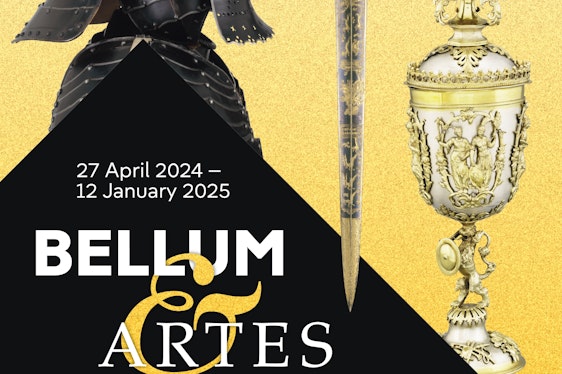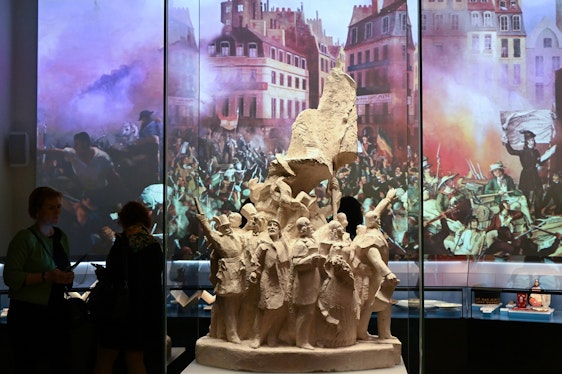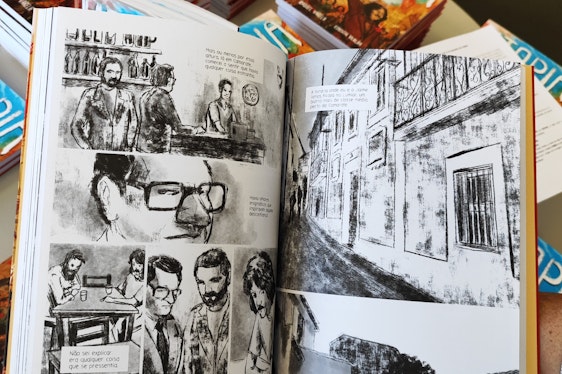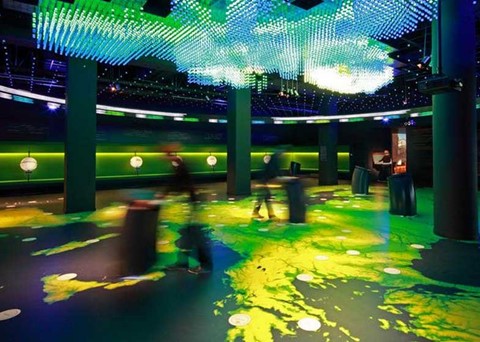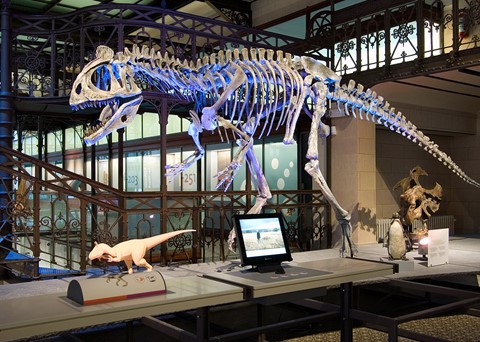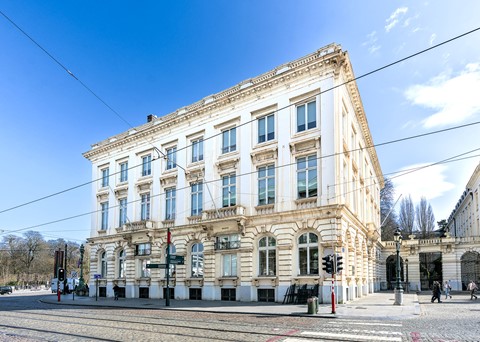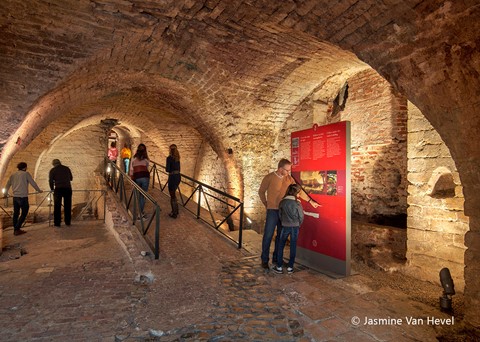House of European History
At the heart of the House of European History, the permanent exhibition galleries use objects, reconstructions and multimedia resources to take visitors on a thought-provoking narrative that focuses on the continent’s 19th and 20th centuries.
The museum regularly hosts temporary exhibitions. For example, exploring the issue of waste in Europe, disinformation or artwork during wartime. Discover the current temporary exhibition on the website.
Teachers and Students
Learning aids and resources are available both on-site and online. There are downloadable teachers’ notes, class and group activities, along with photographs, written testimonies and videos. These materials can be easily adapted to use with curriculum content.
Families
For families with 6-10 year olds - take a backpack and 'time-travel’ through different periods of Europe’s past! Kids will smell, feel and live history as never before, through role-play games in a 1960s Travel Agency, walking in the shoes of an astronaut or grappling with robots. Family Spaces are available in 24 languages and accessible during opening hours of the museum. Extra facilitated learning activities are on Wednesdays, Saturdays and Sundays at 14:00 to 17:00. Entrance is free. No reservation required.
The museum is family-friendly, with baby-changing facilities and access for buggies. Parents may feel certain aspects of the permanent exhibition are only suitable for children over eleven years old.

- T. +32 2 283 12 20
- Rue Belliard 135 Belliardstraat - 1000 Brussels
- https://historia-europa.ep.eu/
- historia@europarl.europa.eu
On the evening of Saturday 27 April, the House of European History invites you to the opening of its new temporary exhibition Bellum et Artes (War and Arts), about the role of the arts during the Thirty Years' War (1618–1648). Delve into events that shaped Europe in the 17th century and caused the development of legal principles that continue to have an impact today. Learn how the warring parties used artworks as both propaganda tools and ambassadors of peace. Discover vivid depictions of the fighting and horrors the Thirty Years’ War caused, by artists drawing from their own experience, and follow the journey of looted artworks that form part of Europe’s common cultural heritage. Join our guest experts, art historians and curators who will give special insights on the exhibition, experience the new classical violin and cello duo* Roshko brothers, and taste a special 17th-century inspired cocktail by Chemistry & Botanic’s. Come for a historical evening at the museum and enjoy an extraordinary Saturday night! 18.15 and 19.00: Guided tours Starting spot: Fables Room, 1st floor Duration: 45 minutes Language: English People dancing in museum Fables Room, House of European History Register for the tour at 18:15 or 19:00 via our website Expert Talks in the galleries by: Agnieszka Gasior, Silesian Museum in Görlitz, Germany Michael Kaiser, Max Weber Foundation, Bonn, Germany Miroslav Kindl, Olomouc Archdiocesan Museum, Czech Republic Sofia Nestor, The Royal Armoury, Stockholm, Sweden 19.00 to 21.00: Cocktail Bar, location: 1st floor 20.00 to 20.30: Concert by Roshko brothers, location: Fables room, 1st floor
On the 4th of May, ahead of Europe Day 2024, visitors are invited to take part in thematic guided tours on democracy, in English, French and Dutch. Democracy is an ancient tradition and key value for Europe but never a given, rather an endeavour, a struggle, as these tours will show the visitors. The House of European History is contributing by highlighting the struggles and complexity of democracy from its origins until today. The tour would cover topics in different parts of the museum galleries, including for example: - Democracy and the challenges of today - From Subjects to Citizens through revolutions - Voting as a democratic duty - The ‘rise and fall of democracy’ - Protest and participation The duration of each tour is 60 minutes. Visit our website to book your timeslot. Tour schedule 14h00 – EN 14h30 – FR 15h00 – NL 15h30 – EN 16h00 – FR 16h30 – NL
Raquel Varela is the author of ‘A People’s History of the Portuguese Revolution’, which explores the roles of trade unions, artists and women in the military coup, while also providing a rich account of the challenges faced and the victories gained on 25 April 1974, when the Carnation Revolution took place. In this ‘Through the lens of...’ discussion, come and discover more about the revolution through the perspective of eye witnesses, historians, artists and activists of whom Varela interviewed as part of her research for her recent graphic novel ‘Utopia’. Using illustrations of Robson Villaba, ‘Utopia’ travels back in time to the years before the revolution and introduces readers to the semi-fictionalised story of someone who lived through this period in their youth. Join Varela at the museum or online on 28 May, to learn more about the famous military coup through the lens of real people of the carnation revolution. About the speaker Raquel Varela is an assistant professor with Habilitation at the Faculty of Social and Human Sciences at Universidade Nova de Lisboa. She is the author of Peoples History of the Carnation Revolution (Pluto, 2018), Peoples History of Europe (Pluto, 2019) and Utopia (2024), a graphic novel of the carnation revolution. Varela is a social historian and a researcher in global labour history. She is President of the Observatory for Living and Working Conditions, Coordinator of Social Data/Nova, Integrated Researcher of the Research Group History, Territory and Communities CEF/UC/Polo FCSH and Collaborating Researcher at the Center for Global Studies at Universidade Aberta. In 2020 she won the Prize of the Ibero-American Communication Association / University of Oviedo, Spain, for her contribution to global labour history and social movements and was distinguished with the Simone Veil-Project Europe research grant, University of Munich. She is an honorary fellow at the International Institute of Social History (Amsterdam) and from 2011-2021 was a Group Leader in FCSH-UNL. In 2021, she was a visiting researcher at the Institute of European Global Studies at the University of Basel, Switzerland and she also created the Social Data - Digital Platform for Social Sciences at FCSH / Nova.


